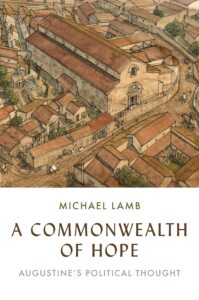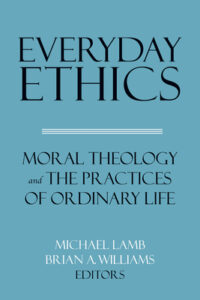A Commonwealth of Hope: Augustine’s Political Thought
by Michael Lamb (Princeton University Press, 2022)

When it comes to politics, Augustine of Hippo is renowned as one of history’s great pessimists, with his sights set firmly on the heavenly city rather than the public square. Many have enlisted him to chasten political hopes, highlighting the realities of evil and encouraging citizens instead to cast their hopes on heaven. A Commonwealth of Hope challenges prevailing interpretations of Augustinian pessimism, offering a new vision of his political thought that can also help today’s citizens sustain hope in the face of despair.
Amid rising inequality, injustice, and political division, many citizens wonder what to hope for in politics and whether it is possible to forge common hopes in a deeply polarized society. Michael Lamb takes up this challenge, offering the first in-depth analysis of Augustine’s virtue of hope and its profound implications for political life. He draws on a wide range of Augustine’s writings—including neglected sermons, letters, and treatises—and integrates insights from political theory, religious studies, theology, and philosophy. Lamb shows how diverse citizens, both religious and secular, can unite around common hopes for the commonwealth.
Recovering this understudied virtue and situating Augustine within his political, rhetorical, and religious contexts, A Commonwealth of Hope reveals how Augustine’s virtue of hope can help us resist the politics of presumption and despair and confront the challenges of our time.
Buy at Princeton University Press, Amazon, or Target.
Praise for the book
“Michael Lamb’s magisterial book gives us an Augustine we so badly need: a great prisoner of hope who resists presumption and despair. Drawing on meticulous scholarship and a creative philosophical analysis of the inimitable African church father, Lamb makes a powerful and compelling case that in our bleak times (much like his) Augustine provides wise encouragement for an active citizenship tempered by humility and mature piety.”—Cornel West, Union Theological Seminary
“This is a terrific book. Against the almost universal consensus that Augustine is an otherworldly pessimist about earthly politics, Michael Lamb offers a subtle, deeply engrossing picture of a more hopeful thinker who saw positive good in civic engagement.”—Alan Ryan, author of On Augustine: The Two Cities
“Lamb’s richly contextual study yields a fresh Augustine, no longer the pessimist who advances a starkly realist stance on the corrupt character of human societies but rather a theorist of hope, navigating wisely between the vices of presumption and despair. A Commonwealth of Hope is a transformative contribution to Augustinian political thought.”—Jennifer A. Herdt, author of Putting on Virtue: The Legacy of the Splendid Vices
“The importance of Michael Lamb’s excellent volume cannot be overstated. Beautifully written, it is a model of erudition. Not only does it revolutionize hope theory by providing a comprehensive account of Augustine on hope, it also significantly contributes to the disciplines of philosophy, political theory, and theology. Lamb’s insights are deep and compelling. Quite simply, this book is not to be missed.”—Nancy Snow, University of Kansas
“Few would deny we suffer from a profound deficit of hope today, a deficit we seek to compensate for with bombast and willful optimism. A Commonwealth of Hope not only uncovers the conceptual intricacies and psychological subtleties of Augustine’s thought, but shows how the theologian’s ideas can offer real insight for political life today. Lamb’s book is a gem.”—Charles Mathewes, University of Virginia
“Michael Lamb leads us whistling past Augustine the otherworldly pessimist and into the hopeful geography of Augustine the perfectionist. It is heady and vital territory.”—James Wetzel, author of Augustine: A Guide for the Perplexed
“A major contribution. Displaying a dazzling familiarity with Augustine and his political thought, Lamb provides an impressive defense of hope as a virtue that can be active and supportive in civic life, and makes a sustained argument that engaging Augustine’s political thought can assist readers today.”—Mary M. Keys, author of Aquinas, Aristotle, and the Promise of the Common Good
Cultivating Virtue in the University
Edited by Jonathan Brant, Edward Brooks, and Michael Lamb (Oxford University Press, 2022)

Across the globe, educators are grappling with how best to prepare a new generation to engage the challenges and opportunities of the twenty-first century. Along with knowledge and skills, many are now emphasizing the importance of character. Yet, while there has been a robust movement to educate character among children and adolescents, much less attention has been given to the ethical formation of college and university students. What is the role of colleges and universities in educating the character of students? Should universities even attempt to cultivate virtue? If so, how can they do so effectively in a pluralistic context?
Cultivating Virtue in the University seeks to answer these questions by gathering diverse perspectives on character education within twenty-first century universities. With essays from some of the world’s leading scholars, this volume catalyzes a critical debate about the possibilities and limits of character education in the university while offering theoretical and practical perspectives on what such education could look like in increasingly global and intercultural institutions. By engaging insights from education, history, literature, philosophy, psychology, sociology, and theology, the volume encourages scholars and educators to embrace the opportunities and challenges of cultivating virtue in the university.
Buy at Oxford University Press, Amazon, or Bookmarks.
Contributors
- Nigel Biggar, University of Oxford
- Jonathan Brant, University of Oxford
- Edward Brooks, University of Oxford
- Joanna Collicutt, University of Oxford
- Liz Gulliford, University of Northampton
- Michael Lamb, Wake Forest University
- Lesley Larkin, Northern Michigan University
- Christian Miller, Wake Forest University
- Blaire Morgan, University of Worcester
- Paula M. L. Moya, Stanford University
- Baroness Onora O’Neill, University of Cambridge
- Julie Reuben, Harvard University
- Jessica Richard, Wake Forest University
- Chad Wellmon, University of Virginia
- Brian A. Williams, Eastern University
Everyday Ethics: Moral Theology and the Practices of Ordinary Life
Edited by Michael Lamb and Brian A. Williams (Georgetown University Press, 2019)

What might we learn if the study of ethics focused less on hard cases and more on the practices of everyday life? In Everyday Ethics, Michael Lamb and Brian Williams gather some of the world’s leading scholars and practitioners of moral theology (including some GUP authors) to explore that question in dialogue with anthropology and the social sciences. Inspired by the work of Michael Banner, these scholars cross disciplinary boundaries to analyze the ethics of ordinary practices—from eating, learning, and loving thy neighbor to borrowing and spending, using technology, and working in a flexible economy. Along the way, they consider the moral and methodological questions that emerge from this interdisciplinary dialogue and assess the implications for the future of moral theology.
“This is a fresh, insightful and highly stimulating contribution to debates about the nature of Christian ethics and the relation between theology and the social sciences. The book responds to Michael Banner’s important recent proposal that theological ethics be grounded in an “everyday ethics” schooled by social anthropology. Banner’s intervention is one of the most fruitful and creative contributions to the field in the last decade and, as such, both merits and needs contextualization and critical interpretation. This collection offers precisely that, serving as an excellent ‘companion’ to Banner, while also extending his insights into new areas and complementing and challenging it with a range of new perspectives. Much more than a dialogue with a single thinker, the book turns out to be an authoritative guide into many of the contemporary concerns and possibilities of theological ethics as a whole.”—Jonathan Chaplin, Independent researcher and writer, Member, Cambridge University Divinity Faculty
Buy at Georgetown University Press, Amazon, or Bookmarks.
Contributors
- Michael Banner, University of Cambridge
- Luke Bretherton, Duke University
- Brian Brock, University of Aberdeen
- Morgan Clarke, University of Oxford
- Molly Farneth, Haverford College
- Craig M. Gay, Regent College
- Eric Gregory, Princeton University
- Jennifer Herdt, Yale University
- Michael Lamb, Wake Forest University
- Philip Lorish, University of Virginia
- Charles T. Mathewes, University of Virginia
- Patrick McKearney, University of Cambridge
- Stephanie Mota Thurston, Princeton Theological Seminary
- Rachel Muers, University of Leeds
- Justin Welby, Archbishop of Canterbury
- Brian A. Williams, Eastern University